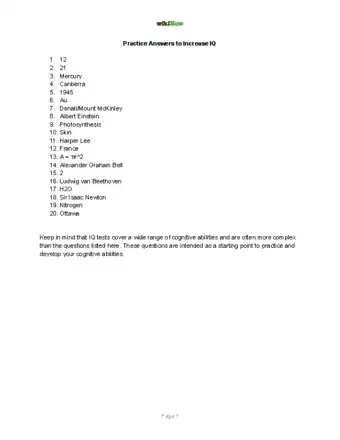This article was co-authored by Katherine Demby. Katherine Demby is an Academic Consultant based in New York City. Katherine specializes in tutoring for the LSAT, GRE, SAT, ACT, and academic subjects for high school and college students. She holds a BA in History and Political Science from the University of North Carolina at Chapel Hill and a JD from Yale Law School. Katherine is also a freelance writer and editor.
There are 14 references cited in this article, which can be found at the bottom of the page.
wikiHow marks an article as reader-approved once it receives enough positive feedback. This article received 53 testimonials and 83% of readers who voted found it helpful, earning it our reader-approved status.
This article has been viewed 890,865 times.
With a few life hacks, you may be able to boost your IQ by one standard deviation. Challenge your brain by breaking your routines, reading, solving puzzles, and seeking new experiences to increase your IQ. Supplement your efforts by getting plenty of protein, vitamin B, and rest, all of which enhance your brain's ability to remain alert. The right diet and lifestyle can do wonders. Are you ready?
Steps
Changing Your Routine
-
1Do everyday things differently. Challenge your brain to form new connections and pathways by doing the things you normally do on autopilot differently. Brush your teeth with your non-dominant hand. Walk around as if you’re going backwards through time. Talk to yourself in a different language. Whatever you can do to mix it up, do it![1]
- Doing this forms new pathways and connections in your brain. Quite often we take for granted how easy life is, especially once we get the basics down. When you mix it up, your brain has to relearn the skill, challenging it all the more.
-
2Meditate. Much research has shown that not only is meditating good for stress levels and mood, but it’s also good for brain functioning.[2] It has been shown to improve blood flow to the brain, patience, concentration, and memory. And it's totally relaxing, too.
- Try 30 minutes each day. You may split this into 10 or 15 minute blocks 2-3 times a day. It is preferable to do when you wake up, after you exercise, and at night directly before you go to bed.
Advertisement -
3Consider taking supplements. A much safer alternative to taking "smart" drugs is taking natural supplements. Just make sure you're taking the right amount by talking to your doctor first. All of the ones below come backed by scientific research:
-
4Start doing regular aerobic exercise. Aerobic exercise seems to be more beneficial. Exercise twice a day for 45 minutes when you wake up and before you go to bed. You should preferably couple this with meditation after you exercise.[7]
- This is good for your waistline, too, and fitness, in turn, can improve your mood. The more endorphins you release in your exercise sessions, the more active your brain is and the better you'll feel.
-
5Sleep when your brain actually wants it. Some people are in their prime thinking zone at 9 in the morning. Some at 9 at night. Even others at 2 AM or whenever they’ve finished their third cup of coffee. Since everyone is different, sleep when your brain wants it. Do you do your best work at night? Then sleep late. You’re not being lazy, you’re being wise![8]
- Aim to get a solid 7-9 hours of sleep a night, too. When you're tired, your brain can't function at 100%. It cuts down what it thinks it can, sort of putting you in hibernation mode, and only does what it absolutely has to to keep you alive and breathing. Consistent inadequate sleep also prevents your brain from developing to its full potential, and can lead to various mental and physical illnesses down the line.
Practicing Your Skills
-
1Read more. Genetics aside, education is a big factor contributing to your IQ. Try reading up on the sciences, such as mathematics and physics. Sciences increase your understanding of the world, which in turn improves comprehension, vocabulary, spatial and mathematical abilities, and logic.[9]
- You can try MIT OpenCourseware, which offers notes, syllabuses, and tests from over 1800 official MIT courses. You can also go for Coursera, KhanAcademy, or even YouTube.
-
2Do word puzzles and problem-solving games. To stave off dementia and to keep your brain churning away at high speeds, make sure to do puzzles and games regularly – which means (in this day and age) more time on the Internet and your phone! Download apps like Lumosity, What Saying, Quiz Up, and other games that get your brain juices flowing. Put down the Candy Crush and spend some time instead improving your IQ![10]
- The Wechsler Adult Intelligence Scale and the Stanford-Binet do not measure intelligence in a single, simple form. Rather, they have a set of problems which measure your ability to process things quickly, understand what you are told, and recognize sequences.
-
3Take the tests over and over. Just like that chemistry test you had to take four times in high school to pass, IQ tests aren’t all that different. They have the same basic structure and types of questions over and over. Therefore, the more you take it, the better you’ll do.
- The tests you can take for free online aren't like the actual tests you might take through a career center or a psychiatrist. If you want your real IQ, you'll have to take the real thing. There is generally a fee, so always try your hardest.
-
4Get new experiences. When you do the same thing day in and day out, the brain sort of goes on autopilot. It stops taking in stimuli, comfortable in its surroundings. When you have new experiences though, the brain wakes up and takes it all in, revving up for a change. So instead of popping in that DVD tonight, find a museum, a show, or a new place to check out to keep your mental clock ticking wildly.
- Even just visiting a new place or trying a new food is a good experience. You're widening your knowledge, making yourself better informed for future decisions. However, the more different they are, the better. Consider it an excuse for an exotic vacation!
-
5Teach yourself something new. Actively learning new things helps your brain learn and may help you make connections that before were not possible. Learning a new skill such as how to play chess or lacrosse, how to juggle, or anything you've never done before for that matter – may help your brain in ways you never even dreamed of.[11]
- Learning another language is a great way to get the brain working on new pathways. Not only does it fire up centers in your brain that aren't being used, but it's real-world applicable and impressive to boot.
Changing Your Diet
-
1Eat plenty of protein for breakfast. Protein has the ability to increase your brain’s production of neurotransmitters, and increases norepinephrine and dopamine levels in turn – all of which increases your alertness and problem-solving skills.[12]
- This is especially important for breakfast to get you ready and raring to go for the day.[13] Sugar for breakfast just leads to a crash in a couple of hours, slowing you down, and leaving you even hungrier than before.
-
2Snack on dark chocolate.[14] Dark chocolate is full of antioxidants and loaded with flavonols. It’s also high in magnesium, vitamins A, B1, B2, D, and E.3 It's a powerhouse of antioxidants that helps fight off free radicals. This makes sure our bodies stay healthy and strong.
- Not too much though, of course. Anywhere between 1 and 5 ounces a day is good.
-
3Get more vitamin B. This little nutrient increases blood flow to the brain.[15] You can find vitamin B in green, leafy vegetables, whole wheat, meat, eggs, and cheese. Just be sure that you don't get too much either! Talk to your doctor about the appropriate amount for you.
- Folic acid, riboflavin, thiamine, and niacin are all part of the structure of vitamin B. When you get vitamin B, you get a powerhouse of goodies all in one.
-
4Avoid processed and junk foods. Many studies have shown that a healthy diet is linked to a higher IQ, especially in children. To keep your brain firing on all pistons, stay away from junk food like cookies and chips and processed food – do the cooking at home to help your brain and your budget.[16]
- Vegetarians have higher IQs on the whole, by about 5 points for both sexes.[17] To get the extra boost, make "Meatless Monday" a regular thing throughout the week.
-
5Consider fasting intermittently. IF, or intermittent fasting, has been shown to lead to increased brain power and higher level functioning. IF is where you don’t eat for 16 hours, and eat plenty for 8. It may or may not mean caloric restriction, depending on how you do it.[18]
- You can also use this technique to manage your weight. Many fast intermittently and see great results in terms of weight loss. Just make sure you're doing it safely – fasting isn't for everyone (the elderly, expecting mothers, young children, etc.).
Practice Exercises and Answers
Expert Q&A
-
QuestionHow can I become more intelligent?
 Katherine DembyKatherine Demby is an Academic Consultant based in New York City. Katherine specializes in tutoring for the LSAT, GRE, SAT, ACT, and academic subjects for high school and college students. She holds a BA in History and Political Science from the University of North Carolina at Chapel Hill and a JD from Yale Law School. Katherine is also a freelance writer and editor.
Katherine DembyKatherine Demby is an Academic Consultant based in New York City. Katherine specializes in tutoring for the LSAT, GRE, SAT, ACT, and academic subjects for high school and college students. She holds a BA in History and Political Science from the University of North Carolina at Chapel Hill and a JD from Yale Law School. Katherine is also a freelance writer and editor.
Test Prep Specialist Do puzzles every day to help boost your problem-solving skills and learn new information.
Do puzzles every day to help boost your problem-solving skills and learn new information.
Warnings
- Don't overwork your children! Children need motivation first, and if you push them too hard and aggressively without the motivation they need, they will find no motivation in the subject you are trying to teach them, and they may permanently have difficulties learning the subject.⧼thumbs_response⧽
References
- ↑ https://www.sciencedirect.com/science/article/abs/pii/S0149763415001281
- ↑ https://www.frontiersin.org/articles/10.3389/fnbeh.2014.00017/full
- ↑ http://www.ncbi.nlm.nih.gov/pubmed/18681988
- ↑ http://www.ncbi.nlm.nih.gov/pmc/articles/PMC1691485/pdf/14561278.pdf
- ↑ http://www.ncbi.nlm.nih.gov/pubmed/11026748
- ↑ http://www.plosone.org/article/info:doi/10.1371/journal.pone.0046832
- ↑ https://www.nia.nih.gov/health/cognitive-health-and-older-adults#active
- ↑ https://www.nia.nih.gov/health/cognitive-health-and-older-adults#active
- ↑ https://www.nia.nih.gov/health/cognitive-health-and-older-adults#active
- ↑ Katherine Demby. Test Prep Specialist. Expert Interview. 17 December 2020.
- ↑ https://www.nia.nih.gov/health/cognitive-health-and-older-adults#active
- ↑ https://www.ncbi.nlm.nih.gov/pmc/articles/PMC6627761/
- ↑ Katherine Demby. Test Prep Specialist. Expert Interview. 17 December 2020.
- ↑ http://www.ncbi.nlm.nih.gov/pubmed/22892813
- ↑ http://www.ncbi.nlm.nih.gov/pubmed/12826740
- ↑ http://www.bbc.co.uk/news/health-12381041
- ↑ http://news.bbc.co.uk/2/hi/health/6180753.stm
- ↑ https://pubmed.ncbi.nlm.nih.gov/26438184/
About This Article
To increase your IQ, teach yourself a new skill like playing chess or juggling, since the new activity will help your brain form more connections and pathways. Additionally, break with your daily routine and visit new places, such as museums or shows, to take in new stimuli. Alternatively, keep your brain active, do word and numerical puzzles on apps like Lumosity. You could also grow your knowledge by reading up on math and science by using free online materials like MIT OpenCourseware. To find out how changing your diet could help you improve your IQ, read on!

















































































Medical Disclaimer
The content of this article is not intended to be a substitute for professional medical advice, examination, diagnosis, or treatment. You should always contact your doctor or other qualified healthcare professional before starting, changing, or stopping any kind of health treatment.
Read More...